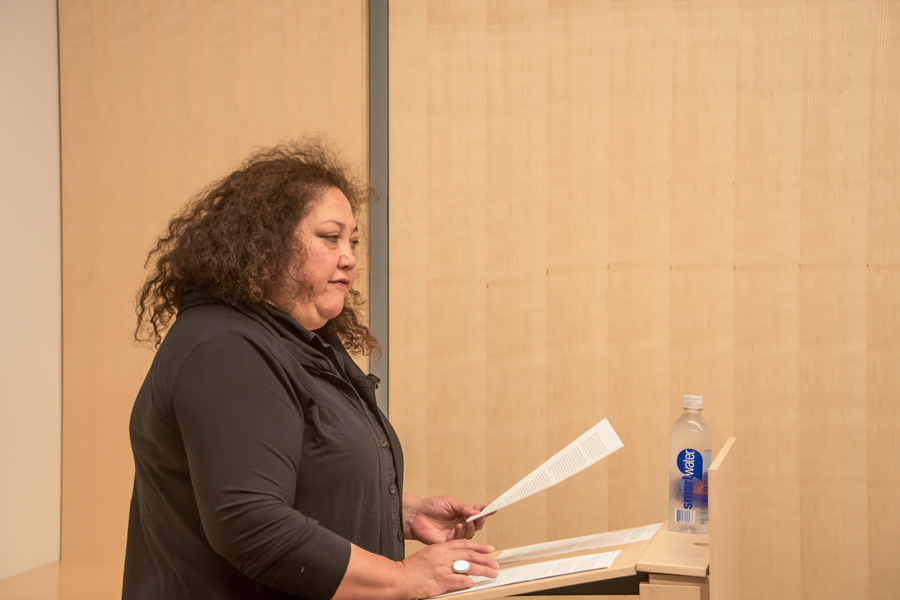Wells College professor discusses identity differences, fostering community at book talk
David Lee/The Daily Northwestern
Wells College Prof. Lisa Hall talks about her book project in Kresge Hall on Thursday. She said storytelling can be a tool of “decolonization and transformation.”
September 29, 2017
Wells College women’s studies Prof. Lisa Hall addressed the importance of storytelling in creating relationships and combating differences while discussing her ongoing book project at an event Thursday.
The event, held at Kresge Hall and co-hosted by the Center for Native American and Indigenous Research and the Global Indigenous Studies Group, follows the announcement that the University will establish a Native American and indigenous studies minor.
During the talk, Hall discussed racial identities and the exclusion of different cultural backgrounds from the dominant narrative to an audience of about 30 people.
She said storytelling is a link that connects and perpetuates the various focuses in her book, “Making Relations in the House of Difference.”
“Storytelling is important, especially as a tool of decolonization and transformation,” Hall said. “Stories are about responsibility and action. They have kept us alive.”
Hall said storytelling is especially important to women of color and indigenous peoples, who have been institutionally oppressed due to ignorance or academic exclusion. She said students are able to recite lines from Shakespeare and recall dates from major Anglo-Saxon battles, but are unable to understand the histories of other ethnic groups because schools don’t teach them.
The Eurocentric nature of higher education contributes to the erasure of ethnic and indigenous narratives, Hall said. This ignorance, she said, is “the cornerstone to maintaining institutional oppression.”
“The legacy of the segregated intellectual system is a profound ignorance about everything other than the dominant narrative,” she said.
Hall called her book a “theory memoir” about her experiences examining ethnic, gender and indigenous studies.
Weinberg senior Henry Chen said the timing of Hall’s talk was appropriate because indigenous studies at Northwestern haven’t been explored as much as Asian or African studies. He said the talk was a good start to creating awareness for the program.
“It’s important that she was invited to come here as an initiative to expand the Native studies program,” Chen said.
The Center for Native American and Indigenous Research launched earlier in September. Medill Prof. Patty Loew, who heads the center, is also working to create the eventual minor.
SESP senior Pooja Kanthawar said she enjoyed how Hall addressed the idea of collaborative learning and its impact on relationships.
“I like how she showcased her emphasis on relationships and how that really guides you and takes shape in how we interact with people,” Kanthawar said.
Hall also said building relationships with people from different backgrounds can help them embrace differences, which should be recognized as a “great, potentially creative, force.”
She said differences between people are inevitable, but denial and ignorance can disrupt relationships. Acceptance and inclusion are integral to maintaining strong relationships, she said, and people need diverse social networks to learn.
“We have to learn to speak to and across difference,” Hall said. “What were we born? What will we become? What stories are we responsible for?”
Email: chloelaw2021@u.northwestern.edu
Twitter: @chloelaw83



